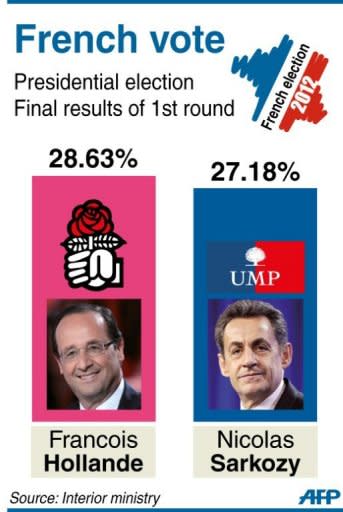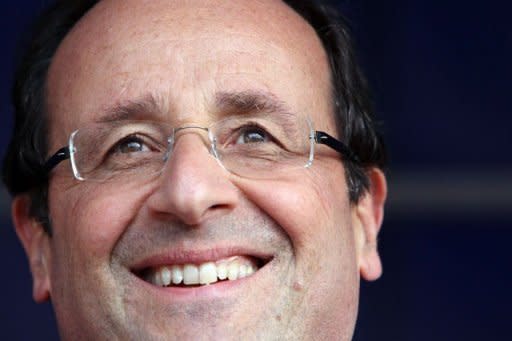Sarkozy, Hollande step up battle to woo French far right
Nicolas Sarkozy and Socialist rival Francois Hollande stepped up their battle Tuesday for the over six million votes that went to the far right in the first round of France's presidential election. "It's up to me to convince the National Front (FN) voters," Hollande told Liberation newspaper, arguing that many of them were in fact left-wing and their support for the anti-immigrant, anti-EU party was a protest vote. Hollande won Sunday's first round with 28.6 percent of the vote over 27.2 percent for Sarkozy and the two will square off in a final round on May 6 that opinion polls say the Socialist will win. The latest poll by OpinionWay released Tuesday showed Hollande beating Sarkozy with 54 percent of the vote in the run-off, a number unchanged from estimates released immediately after the first round. But both candidates know their fate may rest in the hands of the 18 percent of voters who plumped for National Front leader Marine Le Pen, who wants to ditch the euro and who rails against the "Islamisation" of France. The election has laid bare deep French fears over globalisation, the European debt crisis and austerity measures aimed at stemming it. Hollande told Liberation the FN vote was an expression of "social anger" and that he hoped to be able to bring these disgruntled voters back to the mainstream. He said voters identified Sarkozy with the European Union's free-market ideology and austerity measures the bloc has imposed across the continent to try to contain its lingering debt crisis. Hollande's promised alternative is to emphasise measures for growth to stem France's rising unemployment, which now stands at nearly three million out of a population of 65 million. The Socialist campaigned Tuesday in the northern Aisne region, where he met factory workers in an area where Le Pen came second in the first round. "There is a need for change... We will change the president, we will change the policies, we will change the (parliamentary) majority, we will change Europe and we will again have confidence in ourselves," he said in a speech to several hundred people outside the factory. In an interview later with TF1 television, Hollande said he would listen to the concerns of those who backed Le Pen. "There was an anger that was expressed from numerous sectors," he said. "And I hear them, I understand them, even if I do not accept that this translated into a vote for the far right." Sarkozy meanwhile continued to step up the right-wing rhetoric he has deployed during his campaign to try to woo FN voters. At a rally in Longjumeau in the Paris suburbs, he hammered home the themes he has pushed for months -- protecting "the French way of life," reducing immigration and encouraging hard work. He said the FN's first-round result, which shocked many in France and raised concerns across Europe, was not "reprehensible" because Le Pen had the right to stand for office and was therefore "compatible with the republic." "The FN vote must be understood," he told supporters. The incumbent has announced plans to hold a mass rally in Paris on May 1, the national labour day holiday on which the National Front every year holds a march in Paris to honour the memory of Joan of Arc. Le Pen has said that at that march she will give her "opinion" to her supporters on whom to back in the decisive second vote, but analysts say it is unlikely she will endorse either candidate. Polls show most far-right supporters prefer Sarkozy, but up to a quarter -- mainly working-class voters attracted by Le Pen's protectionist trade policies -- could switch to Hollande. The French left has not won a presidential election in a quarter of a century, but with France mired in low growth and rising joblessness, opinion polls had long predicted Hollande would beat Sarkozy. Hollande says Sarkozy has trapped France in a downward spiral of austerity and job losses, while Sarkozy says his rival is inexperienced and weak-willed and would spark financial panic through reckless spending pledges.




